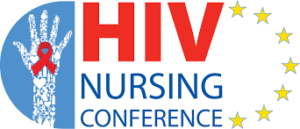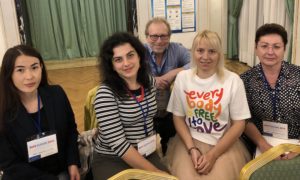 In September 3 nurses from the EECA region – Ukraine, Kazakhstan, and Kyrgyzstan visited Rome and participated in HIV Nursing 2019 conference.
In September 3 nurses from the EECA region – Ukraine, Kazakhstan, and Kyrgyzstan visited Rome and participated in HIV Nursing 2019 conference.
The event focused on the role of nurse clinical leadership in supporting global programmatic targets (90-90-90) and the Sustainable Development Goal of ending AIDS as a public health threat.
Why nurses?
Since the beginning of the HIV epidemic, nurses have been at the front line of care delivery. It is vital their work is up to date and evidence based, underpinned by findings from research that identifies best approaches for managing HIV and its comorbid conditions. Nurses are ideally placed to promote and deliver high-quality HIV prevention, care, and treatment that meets the needs of affected people and maximizes the prevention of infection for the most at-risk individuals.
These two days in Rome offered an excellent opportunity for discussion, debate, and networking, as nurses collectively work to improve the prevention, care, and treatment services delivered to people affected by HIV. The event also focused on the role of nursing leadership in ensuring these services are of the highest quality, and ways nurses can be best prepared and informed for their role.
EECA region
 3 nurses from the EECA region supported by AFEW also participated in this event. That was a great chance for them to be involved into international society and to gain experience from specialists from other countries.
3 nurses from the EECA region supported by AFEW also participated in this event. That was a great chance for them to be involved into international society and to gain experience from specialists from other countries.
Irina Vlasenko, a medical nurse of the “Trust” Counselling Room (Ukraine)
“Favourable and easy-going atmosphere of the place and event gave me a push towards a new understanding of the role of a nurse in the HIV/AIDS field. During the topic discussion it became clear that aside from the technical execution of duties in accordance with the treatment protocols, it is also important to organize the work process clearly and be creative in how you deal with patient care.
With the current fast-moving spread of HIV there comes a necessity to constantly improve one’s level of knowledge and skills through self-development and knowledge exchange at such events. The contribution of medical nurses to helping people living with HIV (PLHIV) is much greater than it may seem at a first glance. At the stage of diagnosing HIV and receiving an assignment for antiretroviral therapy a patient is actively communicating with an infectious disease doctor, but when it comes to the continuation of treatment the main role is given to the medical nurse. A nurse carries a great responsibility not only for executing quality medical care in the outpatient conditions for a patient with HIV, but also for educating patients and members of their family or other people supporting them on the proper care and prevention activities in their daily lives.
I am an activist of a women’s union, so I know about the necessity to pay attention to gender-oriented services, the specifics of treating women and receiving of pre-exposure prophylaxis (PrEP) by risk groups, working on prevention and overcoming of stigma, discrimination and violence.”
Olga Petrova, senior medical nurse, city AIDS center (Kazakhstan)
“I really liked the report “Nursing leadership in fighting HIV”. Unfortunately, we don’t have a fully developed leadership among nurses, though our patients are in active contact with them, which provides opportunities to determine what kind of problems arise in the course of treatment. Going forward I plan to organize training for nurses on such topics as: how to establish partner relationships with a patient, how to provide psychological and social support to them. I think that the role of a nurse in psychological support of ARV-therapy is very important! I hope that participation in the conference will help me further in my work.”
Saliya Koychieva, epidemiologist/visiting nurse, AIDS center, Bishkek (Kyrgyzstan)
“The most memorable thing at the conference for me was that stigma and discrimination towards people living with HIV (PLHIV) is much lower in other countries than in our Kyrgyz republic. So the level of self-stigma and self-discrimination among those people is much lower. This situation definitely has a positive impact on the PLHIV community and decreases barriers for disclosing HIV-positive status to their sexual partners, family members and the surrounding community. Due to the tolerant attitude of society to PLHIV, they have very good indicators of ARV therapy intake and viral suppression, so PLHIV start ARV therapy much faster after finding out about their positive status, and later on not many of them stop the treatment.
Also, I noted that medical workers with HIV-positive status in other countries are allowed to retain their job, so when workers follow all the regulations for infection control, they can perform invasive procedures.
If our medical workers who are doing invasive procedures have been tested positively for HIV, they would need to be transferred to the kind of work that doesn’t include injections.
I am sure that we have to take into consideration all of the above in order to reach the strategy 90-90-90. In the first place, this could be achieved by conducting informational and educational work about HIV among organized and non-organized groups of people in order to decrease stigma and discrimination.
It is necessary to train and involve more peer consultants in our work with PLHIV, which will have a positive influence on accepting HIV-status by PLHIV and disclosing it to their surrounding community. PLHIV are much more open to accepting advice from a person who lives with HIV too and can find a solution in any sort of difficult family, medical, or civil situation by applying simple and tested algorithms.
Also, I believe that it is absolutely necessary to involve peer consultants who are ready to disclose their HIV+ status and to work with the general public in order to provide trustworthy information about living with HIV. It is important to disseminate and develop this experience so that in any town, remote region or rural area PLHIV could turn for support.”



